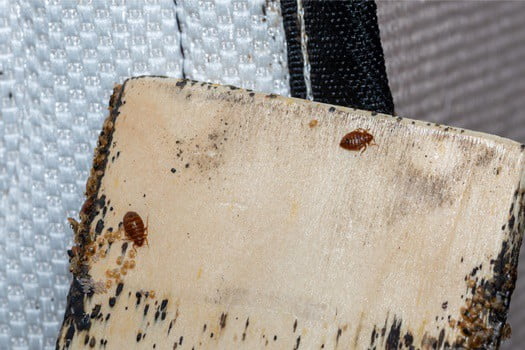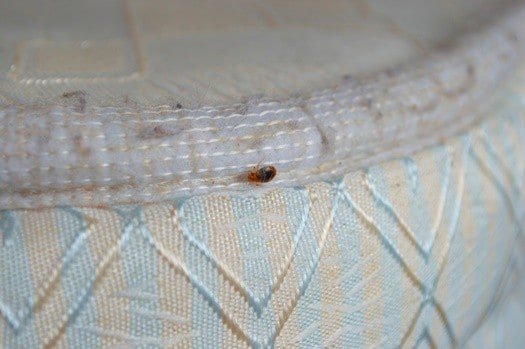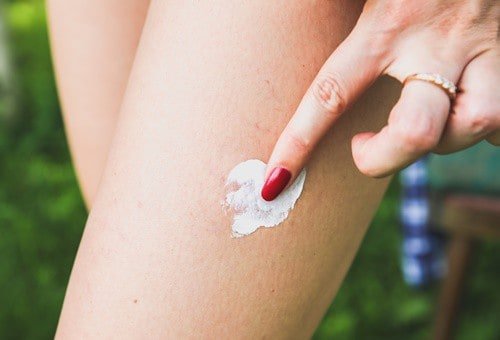When a bed bug bites you, you won’t feel it straight away. But eventually, an itchy red bump will appear, when your immune system reacts to the bite. Bed bug bite reactions aren’t immediate, so you may not notice it for some time.
The time it takes for bed bug bites to appear varies from person to person. Some people react within hours, but a delayed reaction is more common. Usually, a red bump will appear between two days and two weeks after the bite occurs. Most bites heal within 2-3 weeks.
We’ll look at how soon you can feel and see a bed bug bite after being bitten. We’ll then explore the factors that can affect bed bug bite reaction time. Finally, you’ll discover how long bed bug bites take to heal, and how to speed up the process.
Do You Feel a Bed Bug Bite Immediately?
It’s normal to panic when you find signs of bed bugs in your home. They’re notoriously tough to get rid of, and can make life difficult.
The first thing you may wonder, upon discovering bed bugs, is whether you’ve been bitten yet. Could a bed bug have been taking your blood without you realizing it? Unfortunately, if there are signs of bed bugs, it’s likely that you’ve already been bitten.
Most people can’t feel bed bugs crawling on them. Bed bugs are small and light, and they usually feed while you’re asleep. You may feel a bed bug crawling on you if you’re awake, but most people don’t. You can use these clever ways to avoid getting bitten by bed bugs while you sleep.
But what about the bite itself? You won’t feel a bed bug biting you because their saliva contains an anesthetic. It allows the bed bug to feed for a long time, without being disturbed by its host.
Because bed bugs have small mouthparts, you won’t feel any pain when the anesthetic wears off. You’ll only realize you’ve been bitten when your skin starts to react, much later on.
Most people are mildly allergic to bed bug saliva. This means that our immune system sees it as a threatening substance. Special cells called ‘mast cells’ react by releasing histamine, which triggers redness and swelling.
The majority of us have only a mild reaction to bed bug bites. It may take some time before we notice we’ve been bitten. But some people are more sensitive, and react more quickly.
How Long Does It Take for Bed Bug Bites to Show?
Bed bug bite wounds are technically visible as soon as the bug has finished feeding. However, the puncture wounds are so tiny that they’re almost impossible to see with the naked eye.
Unless you examine your skin with a magnifying glass, you probably won’t notice bite marks at first. But, if you’re allergic to bed bug saliva, your immune system will soon react to the foreign substance.
When this happens, a bump will start to appear around the bite mark. It’s usually round, red, and itchy. It may be flat, but most likely will be raised. Bed bug bites may appear alone or in lines or clusters.
How long it takes for bed bug bites to appear depends on the individual. Some people react quickly, within a couple of hours of being bitten.
A delayed reaction is much more common, though. For most people, a bump will develop between two days and two weeks after the bite. This means you may not realize you’ve been bitten for several days afterwards.

If your infestation is large, you’ll likely wake up with new bite marks each day. But the bites themselves may have occurred days ago, with your body only just beginning to react.
For this reason, once you treat your bed bug infestation, you may notice ‘new’ bite marks for some time. When the last bug dies, it may be more than two weeks until you stop noticing new bites.
What Can Affect Bed Bug Bite Reaction Time?
The red bumps that occur when you’ve been bitten by a bed bug may take some time to appear. How long this takes depends on how quickly your immune system reacts.
Bed bug saliva triggers an allergic reaction in the majority of people. This is why bed bug bites are often confused with hives.
But because our immune systems are all different, you may react more quickly or slowly than someone else.
Some people don’t react to bed bug bites at all. According to Pest Control Technology, around 30% of people don’t experience skin reactions in response to bed bug bites.
Such people may believe they aren’t being bitten at all. But if their house is infested, they just can’t see or feel the bites. So, what can cause a differing reaction time after bed bug bite?
- Age. Elderly people may not react at all, or may react mildly, with a delayed reaction. Younger children, under 10 years old, also tend to react more mildly than adults.
- Medication. Certain medications, such as corticosteroids, can suppress the body’s immune response. If you’re on these drugs, you probably won’t react quickly, if at all.
- Skin sensitivity. Some people have more sensitive skin than others. If you react badly to mosquito bites, for example, you may also react severely to bed bug bites. You may react more quickly, or itch more intensely.
The size of your bed bug infestation has no effect on reaction time or severity. Whether your home plays host to five or 5,000 bed bugs, your immune response will be the same.
When Do Bed Bug Bites Start to Itch?
When an allergic reaction occurs, no matter what the allergen is, itching is a common symptom. This happens because of a substance called histamine.
If your body detects the presence of an allergen, it kicks your immune system into action. It sends antibodies and mast cells to the area. When these cells come into contact with the allergen, they release histamine.
The purpose of histamine is to get rid of the foreign substance – in this case, bed bug saliva. And it does do an excellent job at this. However, while the histamine is working, it can cause an uncomfortable skin reaction. This may involve itching, redness, and swelling.
Your bed bug bites will start to itch almost as soon as histamine is released. Depending on your sensitivity, the timeline will vary. It may be a few hours after the bite, or up to two weeks later.
How Itchy Are Bed Bug Bites?
If you have a mild reaction, your bed bug bites may not itch at all. You might notice a small bump, or some mild redness in the area of the bite.
If you react more severely, you may break out in large welts that itch intensely. If this is the case for you, try to resist the urge to scratch. Scratching may break the skin, and could lead to scarring or infection.
It can help to keep the area cool, and apply some over-the-counter cooling cream. This may not make the bites heal quicker, but it will stop them from feeling so irritated.
How Long Do Bed Bug Bites Last?
Bed bug bite marks are unsightly, embarrassing, and itchy. They may be painful, especially if you’ve been scratching them. Fortunately, though, bed bug bites don’t last forever.
For most people, bed bug bites heal within one to two weeks of the marks appearing. Rather than disappearing suddenly, you’ll notice them slowly fading away.
The raised bump will start to flatten out. The redness will begin to fade, becoming paler every day, and the itching will become less intense. Eventually, the bite will disappear completely.
How long bed bug bites take to heal depends on how allergic you are. Bigger and more irritated bite marks usually take longer to heal than smaller ones.

If you react badly to bed bugs, fleas, and mosquitos, the bites will probably take longer to heal. For some people, it can take several weeks for the bites to fade completely.
How long do bed bug bites itch? Bed bug bites typically start to itch as soon as the bite mark appears. Itching is caused by histamine, which is trying to push the bed bug saliva out of your body.
Bed bug bites typically continue to itch until the histamine has gone away, which could take up to two weeks. You’ll likely notice the itching becoming slowly less intense, and less frequent, until it goes away.
Do Bed Bug Bites Leave Scars?
Most bed bug bites won’t leave a permanent mark. This is because the damage done by bed bug mouthparts is so small. Once the bite has faded away, your skin will look unblemished as it did before you were bitten.
However, if you scratch a bed bug bite, there is a higher probability of scarring. This is because scratching can break the skin, expanding the wound. Larger wounds are more likely to leave a visible mark after they’ve healed.
An open wound also has a chance of becoming infected. If a bed bug bite gets infected, there’s a bigger chance that a scar will form.
Bed bug bites can be extremely itchy, and it can be difficult to resist the temptation to scratch. Over-the-counter itch relief creams can help reduce the urge. Try to keep the bites covered, and keep your hands and mind occupied.
If you must itch, use the flat part of your fingertips, rather than your fingernails. Rub gently to avoid breaking the skin.
How Do I Get Rid of Bed Bug Bites?
If you do leave your bed bug bites alone, they will go away eventually. However, you may be in a hurry for the bite marks to heal. If this is the case, there are steps you can take to help get rid of bed bug bites fast.
- Cooling lotions. Irritated bites take longer to go away. Calamine lotion and aloe vera gel can calm irritation and redness, helping bites to heal. Cool showers and baths can also help.
- Oral antihistamines. Oral antihistamines can help prevent you from reacting to bites. They’re most effective when taken at the first sign of a bed bug infestation. But they can also help heal existing bites.
- Antihistamine creams. Antihistamine creams are usually used to treat hives and eczema, but they can also heal bed bug bites. Corticosteroid creams are stronger, so try these if antihistamine creams aren’t working.
- Cortisone shot. For faster healing, ask your dermatologist for a corticosteroid injection (often called a cortisone shot). They can be expensive, but can eliminate bed bug bites practically overnight.
- Antibiotics. If your bed bug bites become infected, antibiotics can be used to treat the infection. This will help the wound to heal and reduce the risk of scarring.
In the meantime, while your bites are healing, you can cover them up with makeup. Use a concealer that matches your skin tone, and nobody will notice the bites.
Of course, if you have a bed bug infestation, you’ll be bitten again anyway. The only real way to stop bed bug bites entirely is to get rid of the bed bugs.
For the most effective bed bug infestation removal, contact a professional exterminator. An expert will remove bed bugs with heat or pesticide.


Thanks for all the great information, Lou! I look forward to exploring your site.
I live in a very small apartment complex, & we all seem to be trading off a large bedbug infestation—as soon as one neighbor gets rid of theirs, another neighbor’s apartment becomes (re)infested. It’s really discouraging!